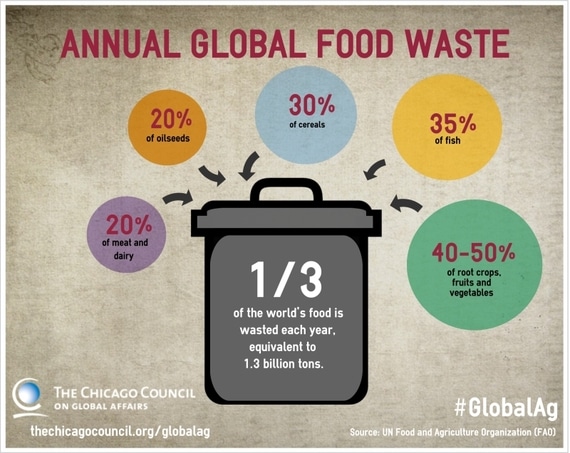Fruits and veggies, food waste, and a healthy planet
By Ted Kyle, RPh, MBA
What’s good for each of us isn’t automatically good for the planet. So says a new study of diet, food waste, and environmental sustainability. “Eat more fruits and veggies” lies at the heart of a lot of advice  for healthy eating.
for healthy eating.
But Zach Conrad and colleagues found that more fruits and veggies also mean more food waste.

One-third of the world’s food is wasted each year, equivalent to 1.3 billion tons. Credit: HuffPost
Not only that, they also found more wasted irrigation water and pesticides linked to diets that include more fruits and veggies. On one environmental dimension, though, fruits and veggies came out on top. Producing fruits and veggies uses less land than other types of food production uses.
Another Link to Complex Systems of Diet and Health
Food and health policy often comes to us in simple sound bites. Eat more fruits and veggies. Less meat, more plants. Sugar is toxic. Eat less, move more.
But those sound bites do a lousy job of delivering the complicated truth of food and health policy. Some of them are outright distortions. Others just fall short of being foolproof.
And that’s where we are with fruits and veggies. This study points to one of the reasons that people keep falling short of recommendations to eat lots of fresh fruits and veggies. They rot and must be discarded. Or people turn down perfectly good, but ugly specimens.
So we are faced with balancing competing interests. We have to figure out ways to maximize the fresh fruits and vegetables we eat, while wasting less of them.
Lessons from the Restaurant Industry
For restaurants, food waste is not just an environmental consideration. It’s about dollars and cents. Food waste equals profit loss. So even in high-end restaurants, chefs like Tim Ma are looking for ways to be frugal about food waste. In his kitchen at Kyirisan, he says:
I’m in this fine-dining world, but I spend a lot of time going through my garbage.
At the end of the day, it’s a business decision. You do this as a function of saving every penny that you can, because the restaurant margins are so slim right now.
Sound Policies, Not Just Sound Bites
Real solutions to food, health, and environmental challenges come from attention to details and facts. Not clever sound bites. Those sound bites might sell a policy. But if we lose sight of the complex systems those policies affect, both sound bites and policies will fail.
Eat your fruits and veggies? Sure. But while you’re at it, pay attention to the health of the planet, too.
Click here for the study from PLOS ONE and here for further perspective from Live Science. For more on restaurants tackling food waste, click here. And for a comprehensive view of the issue, check out these resources from the NRDC.
_____________________
Ted Kyle is a pharmacist and healthcare innovation professional who serves on the Board of Directors for the Obesity Action Coalition and advises The Obesity Society on advocacy. His widely-read daily commentary, published at https://conscienhealth.org/news/, reaches an audience of more than 10,000 thought leaders in health and obesity.
Read this column on Ted’s daily blog, ConscienHealth™ here.
Blue Apron Blog. Foto: Home Chef: Vegetable scraps aren’t kitchen waste, they’re soup material


















